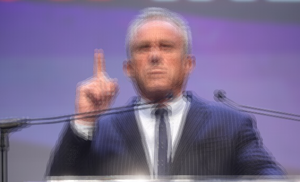
RFK’s promises
The Senate confirmed Robert F. Kennedy Jr. as the new Secretary of Health and Human Services (HHS), marking a significant shift in the leadership of the nation’s largest health agency. Amid opposition from both sides of the aisle and deep concerns from the public health community, Kennedy secured his confirmation through key assurances made to influential lawmakers. Here’s a breakdown of the commitments he made to secure the role.
1. Maintaining the Status Quo on Vaccination Policy
During his confirmation hearings, Kennedy, a longtime vaccine skeptic, faced intense scrutiny over his past statements. However, in a crucial move to gain support, he assured Sen. Bill Cassidy (R-La.), a physician and chair of the Senate Health Committee, that he would not interfere with existing federal vaccine policies. Cassidy, in exchange, negotiated an oversight role in monitoring Kennedy’s actions within HHS. This agreement was key to Kennedy’s confirmation, as concerns mounted over his influence on vaccine messaging and public health efforts.
2. Protecting Medicare and Medicaid Amid Budget Discussions
While Kennedy struggled to articulate a clear understanding of Medicare and Medicaid’s structure during his hearings, he pledged to protect these programs. With Republican lawmakers advocating for significant Medicaid cuts and potential restructuring of Medicare, Kennedy promised that any reforms under his leadership would focus only on eliminating inefficiencies and reducing waste, rather than cutting essential benefits. His ability to navigate these discussions will be crucial as Congress debates major budgetary adjustments.
3. A New Focus on Chronic Disease and Nutrition
Kennedy has repeatedly emphasized his commitment to tackling chronic diseases through dietary and environmental reforms. His “Make America Healthy Again” (MAHA) initiative aims to regulate food additives, promote regenerative agriculture, and overhaul national dietary guidelines. Senators aligned with the MAHA movement, including Sen. Roger Marshall (R-Kan.), have already begun drafting legislation to support Kennedy’s vision, signaling a potential shift in federal health priorities from pharmaceutical interventions to preventative care through nutrition.
4. Reforming the NIH and Redirecting Research Priorities
Another major promise Kennedy made was to reshape the National Institutes of Health (NIH). He vowed to dismiss 600 NIH researchers and reallocate resources away from infectious disease research toward investigating the root causes of chronic conditions. This promise aligns with his broader skepticism of certain public health institutions and aims to refocus federal research on environmental and lifestyle-driven health issues.
How he plans to do this without saying the bad words of social determinants of health is to be determined.
5. Ensuring Oversight and Transparency in HHS
To address concerns about his past positions and potential unilateral decision-making, Kennedy committed to maintaining regular consultations with Senate oversight committees. This agreement includes providing advance notice before making changes to vaccine programs or other major public health policies. His pledge to transparency was instrumental in securing votes from skeptical lawmakers who demanded safeguards against abrupt policy shifts.
6. Navigating the Challenges of Government Restructuring
As Kennedy takes the reins at HHS, he faces an immediate challenge from the Department of Government Efficiency (DOGE), led by Elon Musk, which has already initiated broad-scale government workforce reductions. Despite these constraints, Kennedy has assured senators that he will work within the existing framework to maintain essential public health services while finding efficiencies in HHS operations.
What Comes Next?
While Kennedy’s promises were enough to secure his confirmation, his leadership will be tested in the months ahead. His ability to uphold his commitments while navigating political pressures and budgetary challenges will define his tenure as HHS Secretary. Public health experts, lawmakers, and advocacy groups will be closely watching to see if Kennedy stays true to his pledges—or if his past skepticism of established health policies resurfaces in his decision-making.
For now, his confirmation marks a turning point for HHS, with an emphasis on nutrition reform, chronic disease prevention, and increased oversight. Whether these promises translate into effective policy remains to be seen.
Be a Changemaker – Join Us Today!
Stay ahead of the latest public health developments. Subscribe for free now to receive weekly updates that empower you to lead and create impact.
💡 Every moment counts! Share this blog and invite others to take action for a healthier tomorrow.



